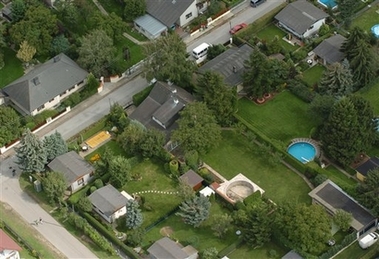VIENNA, Austria - The young woman who endured 8 1/2 years in captivity has
adopted a "reserved attitude" toward her parents since her dramatic escape from
her kidnapper last week, psychologists treating her said Thursday.
Experts who have been meeting with 18-year-old Natascha Kampusch since she
bolted to freedom on Aug 23 told reporters she has been in regular telephone
contact only with her mother and has not had any further contact with her
father. The three had had a tearful reunion when she escaped, and both parents
have begged to be able to see her again.

Areal view of the estate where Austrian
teenager Natascha Kampusch spent eight years in a dingy underground cell
until her dramatic escape last week, on Tuesday, Aug. 29, 2006, in
Strasshof, northeast of Vienna. [AP] |
Monika Pinterits, a lawyer who specializes in representing traumatized young
people, said Kampusch might not decide for weeks or months whether to live with
one of her parents.
They divorced after her abduction as a 10-year-old schoolgirl in March
1998 - a case that until last week was one of Austria's greatest unsolved
mysteries.
Kidnapper Wolfgang Priklopil, 44, killed himself by jumping in front of a
train after Kampusch escaped.
Max Friedrich, a criminal psychiatrist on the team treating Kampusch, said
the years she spent as a prisoner - often confined to a windowless
underground cell - amounted to "isolation torture."
As therapists continued caring for Kampusch in the secure, unidentified
location where she has been resting since escaping Priklopil, police said they
tentatively planned to question her again about her ordeal.
"It all depends on whether Ms. Kampusch can and is willing to talk," said
police Maj. Gen. Gerhard Lang of the Federal Criminal Investigations Bureau.
Police questioned her in three 20-minute sessions on Wednesday, and another
lawyer, Guenter Harrich, said she seemed "rather exhausted" by the time they
were done.
Investigators spent another day gathering evidence from Priklopil's sprawling
home in the Vienna suburb of Strasshof. Lang said officers moving from floor to
floor collecting and preserving fingerprints and traces of DNA expected to
finish that part of the inquiry in a day or two.
Police said they have found no evidence of any other secret rooms like the
cell where Kampusch was kept, which contained books, clothes, a television, a
bed, a toilet and a sink. Investigators say she was allowed to listen to radio
and watch videos, and with the help of a book taught herself how to knit.
Officers cataloging videos and notes for closer examination found a number of
children's and youth books, Lang said.